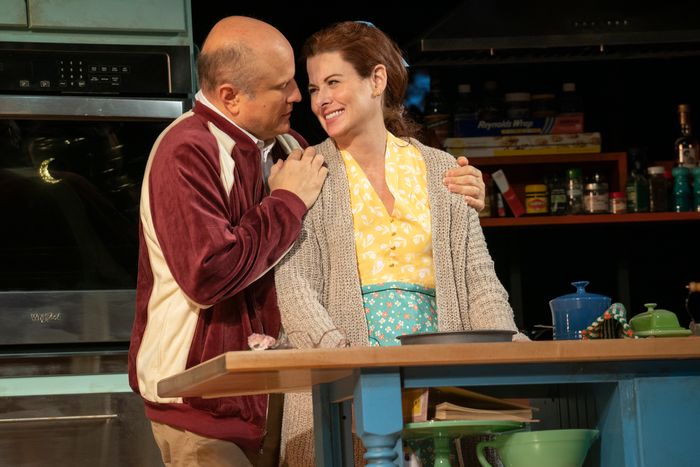
In the new Broadway drama Birthday Candles, the playwright Noah Haidle hopscotches rapidly through time. It takes him about 90 minutes to travel 90 years. We meet Ernestine (Debra Messing) on her 17th birthday, and then we meet her again on that date on succeeding birthdays, visiting her 18th celebration, then some year in her ‘30s, then her 50th, and eventually her 107th. Each time, we find her baking her cake in her kitchen; such domestic repetitions are her ticking clock. But there’s a sense of hours lost here, rather than a life counted up.
Candles will make you think of other, stronger plays: It is certainly an overt homage to Thornton Wilder, whose The Long Christmas Dinner sped through one family’s 90 Christmases, but it also recalls time-compressed dramas like Dan LeFranc’s The Big Meal, or Will Arbery’s Plano, or Will Eno’s The Underlying Chris. And that familiarity goes deeper. I think if you’d never seen a play before in your life you’d still think this rings a bell. Those other dramas handle people’s fates lightly. Long-horizon plots tend to be a little melancholy, but the timeline prevents them from being sentimental about mortality. For all its references to philosophy, though, Birthday Candles doesn’t achieve that existential calm, nor does it contain those other plays’ sense of a network of human connection. Instead it keeps its attention firmly on Ernestine. This focus allows the Roundabout Theater to mount the show as a star vehicle for Messing — but it also constrains and dulls the experience.
That isn’t to say that it can’t be occasionally moving. Ernestine suffers a lot as she grows older. She has a circumscribed life (no mention of friends or education or interests or…), but what she has, she loses. First, her mother Alice (Susannah Flood), who taught her to bake; then her daughter, Madeline (also played by Flood), who loses her mind; later her husband, Matt (John Earl Jelks), to infidelity and then illness. Her son, Billy (Christopher Livingston), marries Joan (Crystal Finn), so grandchildren resupply the kitchen table, but they too stop coming by for the party. There’s just one fixed point in her life: next-door neighbor Kenneth (Enrico Colantoni), who has loved her for years from not-afar. There’s something icky about seeing the boy Ernestine turned down for prom pursuing her for decades, but Colantoni steps deftly and delicately through the writing’s minefield.
When people die, they walk into the void behind Christine Jones’s kitchen set. Above them is a night sky full of things from Ernestine’s life — her wedding bouquet, her son’s piano keyboard, a ribbon her husband brought her for a birthday — and the dying people seem to join that constellation. As their cynosure, Ernestine herself remains a cipher, full of portentous sayings but little real thought. As Messing prepares a real cake onstage, she meditates on the flour — “Atoms left over from creation,” she says, managing to say something both scientifically meaningless and poetically cloying.
It would be one thing if we were laughing at this fatuousness as a character trait: We know that Ernestine is the kind of girl who would ask her baffled mother, “In the career of my soul, how many times have I turned from wonder?” But there are stardusty metaphors and windy pronouncements everywhere. Characters all return to Ernestine’s mantra, “The genius of a party is to offer people a rest. A rest from the daily human errand to travel morning until night. A song. A wish. A breath. And then home.” That seems saccharine to me, but by eavesdropping a bit in the lobby, I gathered that some people did find this stuff meaningful. With language, as with cakes, it depends on how sweet your tooth is.
Before she was a director, Vivienne Benesch was a particularly fine-grained actor, and you see her careful touch in small moments with the cast. When Flood’s Maddie, suicidal and spiraling, helps her mother take off her shoes, she bends to kiss her feet. Finn as the anxious daughter-in-law Joan is a breath of weird air, giving herself little pep talks in the middle of family fights. (Haidle’s comic writing for her is his strongest.) And when it comes time for Kenneth to die, to step into the void behind the kitchen, Colantoni grabs for the doorframe. He’s the only one who tries to claw his way back.
But grace notes can’t sustain a production. Too much rests on Messing’s shoulders, and it’s simply the wrong play for her gifts. She has some odd ideas about playing young — her 17-year-old Ernestine has the physicality of a stomping kindergartner — and during the play’s long middle she’s inert, unable to strike sparks from her family. Even in moments of heightened emotion, Messing seems disconnected from those around her, twinkling at her children but not quite meeting their eyes. She’s strongest when Ernestine gets into her nineties, because Messing’s faraway gaze and abstracted air begin to take on poignancy. What is she seeing? What can she hear? Maybe there’s some other life clamoring for her attention. Or maybe her mind is finally up there amid the constellation of lifetime things. Perhaps she’s finding her place in the expanding universe, traveling farther and faster away.
Birthday Candles is at the American Airlines Theatre.


